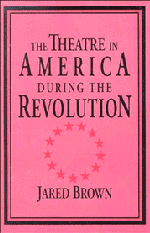9 - American Professional Theatre, 1781–1783
Published online by Cambridge University Press: 29 September 2009
Summary
Congress's injunction against American theatrical entertainments during the prosecution of the Revolution was faithfully obeyed in most of the states; but in Maryland – which, it will be remembered, had voted against Congress's antitheatre resolution in 1778 – that resolution was thoroughly ignored. In 1781, Maryland gave further evidence that it saw no connection between a successful prosecution of the war and the prohibition of theatrical activities when it became the first state to permit an American professional theatre company to perform during the Revolution.
Baltimore and Annapolis, 1781 and 1782
Thomas Wall, a former actor with the American Company who supplemented his income by giving guitar and mandolin lessons, gained permission from the State Council of Maryland on June 8 and offered the first in a series of performances in Annapolis beginning on June 14, 1781. (David Douglass of the American Company had organized the building of the 600-seat theatre ten years before.) Wall advertised “a medley of theatrical trifles” including “A Critical Dissertation [on] Noses.” In Baltimore, eight days later, he appeared at Mr. L'Argeau's Dancing-Room, where his handbill specified that he had come “From Annapolis.” On this occasion, Wall presented “A New Lecture on Heads,” which was followed on June 28 by “The Old Lecture on Heads, not performed here these Eight Years.” The entertainments also featured Wall's seven-year-old daughter, who, in addition to participating in the comic lecture, recited two monologues.
- Type
- Chapter
- Information
- The Theatre in America during the Revolution , pp. 147 - 165Publisher: Cambridge University PressPrint publication year: 1995

